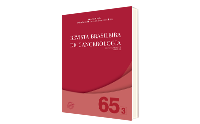Venous Thromboembolism Treatment in Cancer Patients: Update of the Role of Direct Oral Anticoagulants in this Scenario
DOI:
https://doi.org/10.32635/2176-9745.RBC.2019v65n3.387Keywords:
Venous Thromboembolism/drug therapy, Anticoagulants, NeoplasmsAbstract
Cancer is widely known for increasing the risk of thromboembolic complications. The associated risk will be related to the patient's own factors, his/her comorbidities, tumor-related factors, the time of treatment and his/her clinical conditions. Anticoagulant therapy should be prescribed considering the risk of bleeding and VTE recurrence. With the emergence of new oral anticoagulants and their use in patients with thrombosis-associated cancer, studies have been conducted to validate their usage. However, risks should be assessed as to provide the most appropriate and safe therapy. These therapeutic alternatives should be publicized in Oncology services, thus facilitating their usage and a greater benefit to patients.









